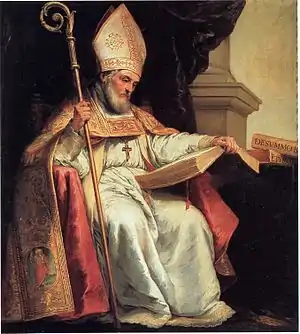Portal:Catholic Church
Introduction The Catholic Church, also known as the Roman Catholic Church, is the largest Christian church, with 1.3 billion baptized Catholics worldwide . It is among the world's oldest and largest international institutions, and has played a prominent role in the history and development of Western civilization. The church consists of 24 sui iuris churches, including the Latin Church and 23 Eastern Catholic Churches, which comprise almost 3,500 dioceses and eparchies located around the world. The pope, who is the bishop of Rome, is the chief pastor of the church. The bishopric of Rome, known as the Holy See, is the central governing authority of the church. The administrative body of the Holy See, the Roman Curia, has its principal offices in Vatican City, a small enclave of the Italian city of Rome, of which the pope is head of state. The core beliefs of Catholicism are found in the Nicene Creed. The Catholic Church teaches that it is the one, holy, catholic and apostolic church founded by Jesus Christ in his Great Commission, that its bishops are the successors of Christ's apostles, and that the pope is the successor to Saint Peter, upon whom primacy was conferred by Jesus Christ. It maintains that it practises the original Christian faith taught by the apostles, preserving the faith infallibly through scripture and sacred tradition as authentically interpreted through the magisterium of the church. The Roman Rite and others of the Latin Church, the Eastern Catholic liturgies, and institutes such as mendicant orders, enclosed monastic orders and third orders reflect a variety of theological and spiritual emphases in the church. Of its seven sacraments, the Eucharist is the principal one, celebrated liturgically in the Mass. The church teaches that through consecration by a priest, the sacrificial bread and wine become the body and blood of Christ. The Virgin Mary is venerated as the Perpetual Virgin, Mother of God, and Queen of Heaven; she is honoured in dogmas and devotions. Catholic social teaching emphasizes voluntary support for the sick, the poor, and the afflicted through the corporal and spiritual works of mercy. The Catholic Church operates tens of thousands of Catholic schools, universities and colleges, hospitals, and orphanages around the world, and is the largest non-government provider of education and health care in the world. Among its other social services are numerous charitable and humanitarian organizations. (Full article...) Selected article  Pope Leo XIII Catholic social teaching comprises those aspects of Catholic doctrine which relate to matters dealing with the collective aspect of humanity. The foundations of modern Catholic social teaching are widely considered to have been laid by Pope Leo XIII's 1891 encyclical letter Rerum Novarum. A distinctive feature of Catholic social teaching is its concern for the poorest members of society. This concern echoes elements of the Jewish law and of the prophetic books of the Old Testament, and recalls the teachings of Jesus Christ recorded in the New Testament, such as his declaration that "whatever you have done for one of these least brothers of Mine, you have done for Me." Another distinctive feature of Catholic social doctrine is the way in which it has consistently critiqued modern social and political ideologies both of the left and of the right: communism, conservatism, socialism, libertarianism, capitalism, liberalism and Nazism have all been condemned, at least in their pure forms, by the Popes at one time or another.
Selected image  Credit: Detroit Publishing Co.
A ca. 1890–1900 photochrom of St. Alexander's Church (Kościół św. Aleksandra in Polish), a Catholic church in Warsaw, Poland, before its destruction in World War II. After the war it was rebuilt on a smaller scale. Selected biography  'The Venerable Bede translates John' Bede (/biːd/; c. 672 or 673 – May 25, 735), also Saint Bede, the Venerable Bede, or (from Latin and Old English) Beda (Old English pronunciation: [ˈbeːdɑ]), was a Benedictine monk at the Northumbrian monastery of Saint Peter at Monkwearmouth, today part of Sunderland, and of its companion monastery, Saint Paul's, in modern Jarrow (see Wearmouth-Jarrow), both Northumbria. He is well known as an author and scholar, and his most famous work, Historia ecclesiastica gentis Anglorum (The Ecclesiastical History of the English People) gained him the title "The father of English history". Bede became known as Venerable Bede (Lat.: Beda Venerabilis) soon after his death, but this was not linked to consideration for sainthood by the Roman Catholic Church. In fact, his title is believed to come from a mistranslation of the Latin inscription on his tomb in Durham Cathedral, intended to be Here lie the venerable bones of Bede, but wrongly interpreted as here lie the bones of the Venerable Bede.
Did you know...
Related portalsFeast Day of May 19 
Dunstan served as an important minister of state to several English kings. He was the most popular saint in England for nearly two centuries, having gained fame for the many stories of his greatness, not least among which were those concerning his famed cunning in defeating the Devil. (Full article...)
Selected quote  Henry Cardinal Manning, Archbishop of Westminster
News

Subcategories Catholic Church Catholic Church by city Catholic Church by continent Catholic Church by country Catholic Church-related lists Catholic particular churches sui iuris Latin Church Eastern Catholic Churches Catholic bibles Buildings and structures of the Catholic Church Catholics Catholic charities Catholic culture Catholic dioceses Ecclesiastical polity of the Catholic Church Catholic ecumenical and interfaith relations History of the Catholic Church Catholic hymns Catholic liturgy Catholic missions Catholic orders and societies Catholic Church organisation Catholic organizations Popes Catholic Church in popular culture Roman Catholic saints Catholic spirituality Catholic studies Catholic theology and doctrine Venerated Catholics Catholic Church portals Outlines of the Catholic Church Catholic Church stubs Topics
The Holy Bible:
Particular Churches (grouped by liturgical rite):
Things you can do
External resourcesWikiProjects
Associated WikimediaThe following Wikimedia Foundation sister projects provide more on this subject:
Discover Wikipedia using portals
|
.jpg.webp)









